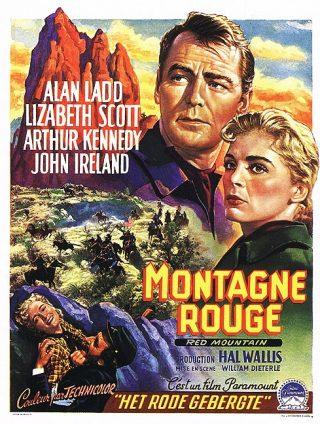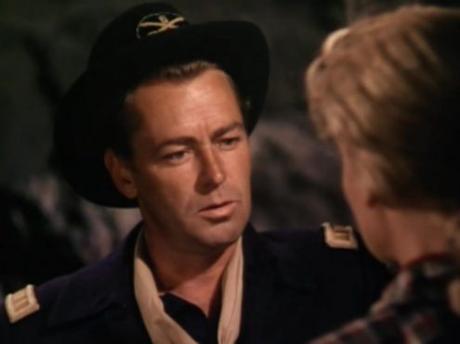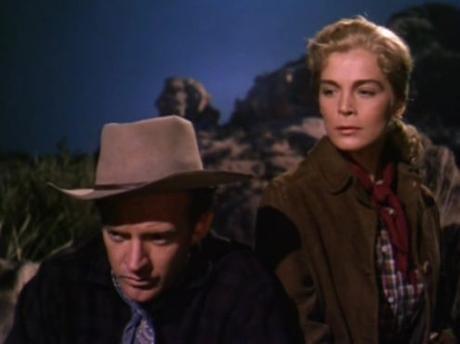
One of the reasons I started this site many years ago was the opportunity it afforded me to write on and maybe draw some attention to movies (many of which happened to be westerns) that appeared to have slipped between the cracks and drifted into relative obscurity. That wasn't the only reason of course, but it was certainly a signficant one. Over time I've tried to broaden my base and mix up my content in a way that pleases me and, I hope, engages and attracts a wide range of visitors. Red Mountain (1951) could be seen as a return to my blogging roots in a sense as it is the type of movie I had in mind at the outset, a western with a big name star and directed by a well regarded filmmaker, with some equally impressive names among the crew, but one which rarely gets mentioned.
This is a fanciful tale, one likely to drive the history buffs crazy as it plays fast and loose with historical facts. However, we're talking about movies here, where artistic license should be granted and where minor matters such as accuracy and fidelity to the known facts are of no more than incidental interest. It opens well, with a faceless killer shooting down an assayer in the town of Broken Bow, the assailant recognizable only by the spurs on his boots. It would seem likely at this stage that we would see a tale focusing on the hunt for this anonymous gunman, and that does appear to be the direction we're headed in, not least when an innocent man is accused and a vengeful posse summoned. That innocent man is Lane Waldron (Arthur Kennedy), one on whom suspicion is heaped not only because he had been seen in the vicinity but largely because he was once a soldier of the Confederacy and these are the dying days of the Civil War. The townsmen all regard him as a potential traitor and are only too willing to set out with the aim of lynching this interloper. Indeed he comes within a hair's breadth of this fate but is spared when Brett Sherwood (Alan Ladd) breaks up the party and rescues the happless Waldron. Sherwood is the real killer of the assayer - this is only confirmed right at the end of the movie but it's acknowledged quite early on in proceedings - and his feelings of guilt and responsibility for Waldron, and later some stronger feelings for the latter's woman Chris (Lizabeth Scott), drive the plot. All of this is intensified when the infamous Quantrill (John Ireland) comes on the scene. The notorious guerilla leader is in the process of stirring up unrest among the Indian tribes, starting with the Utes, with the aim of opening a new front in the west, one with the potential to derail the Union march towards victory.

One doesn't think of German director William Dieterle as a natural for westerns. That said, there's no earthly reason why we should exclude someone like this - the beauty of the western as a genre is its malleability and the kind of inclusiveness it bred among filmmakers where so many diverse types were able to make strong and successful contributions. That Old West setting was the ideal backdrop for so many tales, a largely untouched landscape invested with enough opportunity and presenting so many physial and ethical challenges that almost any human drama was enhanced when it played out there. Dieterle (who apparently was replaced for a time by an uncredited John Farrow due to ill health) uses the New Mexico locations well, presenting a similar view to that pioneered by John Ford with the vast and imposing natural features framing the conflicts dramatically and simultaneously suggesting their relative lack of consequence in the grand scheme - those towering hills and cliffs and endless horizons prevail and gaze impassively on the petty squabbles acted out in the their shadows and dwarfed by their permanence. Charles Lang's cinematography makes the most of the natural beauty and is equally effective in the numerous night time shots. The driving and powerful (perhaps occasionally overpowering) score by Franz Waxman adds urgency and also complements some of the grimmer moments in the film.
Red Mountain was the third western for Alan Ladd, following on successfully from and and paving the way for his signature role in the timeless. While I'm not entirely convinced by some of the writing and characterization in this film, I can't say that any of that affects the quality of the performances. Ladd's star was still in the ascendency at this point and he was tremendously good at tapping into the growing uncertainty of his character; there's a touch of ambiguity there too but it's the burgeoning sense of unease at the path chosen, the war raging within his own soul, which impresses most.

In contrast, Lizabeth Scott's career had already peaked and a few years later any chance of reviving it would be torpedoed by the disgraceful actions of Confidential magazine. She handles her part as the embittered victim of Quantrill's razing of Lawrence, Kansas with assurance. She is sometimes regarded as a film noir actress first and foremost, and she has some stellar credits in that genre to back that view up, but her work in this film and Silver Lode is just fine as far as I am concerned. Arthur Kennedy fades a little as the story develops, a strong start sees him squaring off against Ladd but his character's injury sees him sidelined to some extent and the writing I mentioned above does him no favors. John Ireland's Quantrill offers an interesting study in fanaticism. I particularly appreciated the actors physicality here, using a kind of stiff discomfort to great effect, suggesting a man aware of his own unhinged nature and struggling with some moral straitjacket of his own design. There are also welcome if limited supporting roles for Whit Bissell, Neville Brand and Jeff Corey.
I'm not sure if Red Mountain has received an official release anywhere, which is a pity as the movie has a good deal to recommend it. It represents a strong entry in the filmography of Alan Ladd as he was building his credentials as a western hero and it also adds another layer to the Hollywood work of William Dieterle. Frankly, it's the kind of film that would look just dandy on Blu-ray if it were given a bit of a clean up. I'd like to think that might happen one day.
